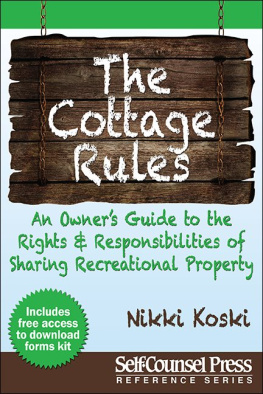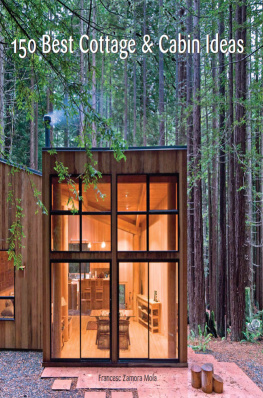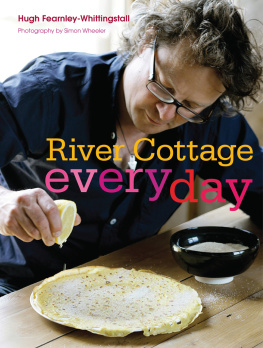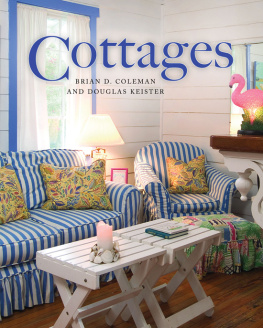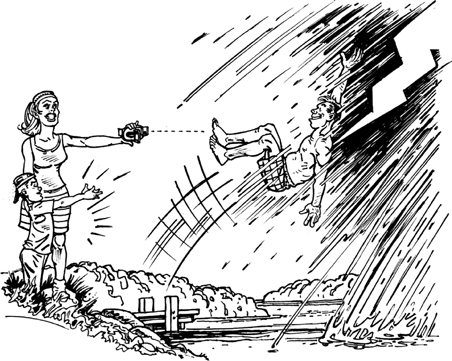Contents
Part 1
Nature Is Nice, but It Could
Use a Little Touch-Up
New Heroes of Cottage Country: Hungover on the
Nature Walk
The New Rules for Cottage Guests (and the New
Rules for Cottage Hosts)
New Heroes of Cottage Country: A Fisherperson at the
Literary Festival
Part 2
For John, the only guy I dont mind losing to.
Introduction
At the Cottage, the work that this book attempts to update, was published in 1989. Cottages were not exactly new then; what was new was that anyone would consider them worth writing about.
The cottage, whether it was called a cottage or a camp or a cabin or a summer place, was pretty much taken for granted by Canadians. Some people had them and some people didnt. The people who had them thought about them in a practical way did the dock need fixing, did the mice get in over the winter, were the taxes going up, how bad did the outhouse smell? The people who didnt have cottages didnt think about them all that much; they were places other people went because they inherited them from their grandfathers.
A lot has changed in seventeen years. The cottage has become an industry, something the expression cottage industry was never meant to describe. It has become myth. It has become a focus for nationalistic sentimentality, one of the things that define us, as the chattering classes like to say.
The cottage has become real estate. It has become an environmental battleground. It has become other kinds of battleground as well, a battle between those who love peace and quiet and canoes, and those who love excitement and power tools and personal watercraft.
In 1989 there wasnt even a generic name for those things that buzzed around in the water. We called them Jet Skis or Sea-Doos or whatever. Then they multiplied, the way obnoxious machines do, until there were so many of them that it was necessary to invent a name for them, other than those naughty things. Now they are personal watercraft, and calling them that, dull as it sounds, didnt seem to stop the spread of them. There are more than ever, although some say the new ones are quieter.
Many of the changes to the cottage simply reflect the changes in society. Cellphones are everywhere in the real world and they are everywhere in cottage country. That means people, particularly teenagers, are less isolated from each other. It also means that people who get lost on the way can call and say they are lost.
In 1989 there was no such thing as email, at least not as far as the vast majority of us were concerned. Now, if we choose to and have the right hookup, we can check it before smelling the outhouse. In fact, we can use the Internet to research the outhouse smell. We can do that for hours, in fact, to stall off doing anything about it.
There didnt use to be same-sex marriage. Well, there was, but it wasnt called that and society as a whole didnt think about it. Now same-sex couples are doing what opposite-sex couples do: they are looking for cottages. Perhaps they are buying all the requisite gear to engage in competitive bird-watching, something that has emerged in recent years too.
In society as a whole, people are getting older. Consequently, they want more comforts and fewer inconveniences. They want more of the labour-saving devices that are available in the city. And they want more golf courses. We are seeing that in cottage country. Soon we may see a boom in labour-saving golf courses.
At one and the same time, the cottage has become romanticized and it has become commercialized. The two feed on each other. The more love we focus on the cottage, either as a concept or a physical place, the more we want to spend on it. And the larger the idea of the cottage looms in our national sentiment, the more desirable it becomes as a piece of real estate, a setting for the latest in decor and gadgetry and barbecue recipes.
Hey, we live in a capitalist society. Thats what happens. Which isnt to say that we cant wait to get there around the twenty-fourth of May.
Part 1
The Cottage: A Progress Report
Getting There Is One-Quarter the Fun
So lets get going, shall we, down the old familiar road. Pack up the old jalopy and hit the highway. However, lets suppose, for the sake of argument, that we havent been down that road for a few years. If we havent, we might find things a bit different.
For a start, the old jalopy is a lot bigger, a van sort of thing, not much fun to drive, but it has to be that big because we are putting more things into it. There are golf clubs now, and wet-suits and CD players and laptop computers and various types of electronic gear. There are cases of bottled water, something we didnt think about years ago. Why would we?
There seems to be a greater variety of food and wine in the van, maybe because there is more storage space for it. And ingredients: youve never seen so many ingredients in one place. The thing about the van is you just throw in all this stuff, not bothering with things like suitcases. Remember suitcases? Without suitcases, you notice the clothes a lot more of them, hiking gear and workout gear and fishing gear and jackets that breathe and shirts that dry fast and boots for this and that.
Fortunately, theres still room for the dog, but the dog has gear too.
Anyway, its good to have the van packed and ready to go, particularly after the long argument about when to do it. There are lots of places where such a discussion doesnt happen such as in a small town where the cottage is just down the road a bit but around the big cities, getting to the cottage demands Strategy. We dont just pack the vehicle and go. No, we Plan.
Is three oclock early enough to beat the traffic? No. And two isnt either? Can you get off work at eleven in the morning? Maybe that will beat the traffic? Cant do it? Well, maybe we should wait until tonight. Say nine oclock. Then all the traffic will be over. But then again, maybe everybodys thinking that. So heres an idea. Why dont we leave right in the middle of rush hour. Nobody will be thinking of that. Its so crazy it might just work.
But it doesnt, of course. Rush hour is always rush hour. Except that these days a lot of hours that arent supposed to be rush are.
What about phoning in sick and leaving on Thursday? Actually, what about going to the cottage on Tuesday and coming back on Friday, against the traffic, and staying in the city on the weekend?
You know someone is in fact doing that, because cottage commuters think of everything. They have tried everything and nothing works, except by total fluke: some days theres nothing on the road and you have clear sailing, and you have no idea why. The next week you leave at the same time and its hell on wheels.
Off we go, whenever it is, the strategizing continuing, driving crosstown instead of uptown, because everybody else will be driving uptown instead of crosstown, except that we forgot about the construction at the bridge, as did several hundred other drivers, and there we are, stuck, with hours to go before we get there, with excited children in the van and an excited dog, and were not even out of the city yet. Were not even within shouting distance of being out of the city yet.


